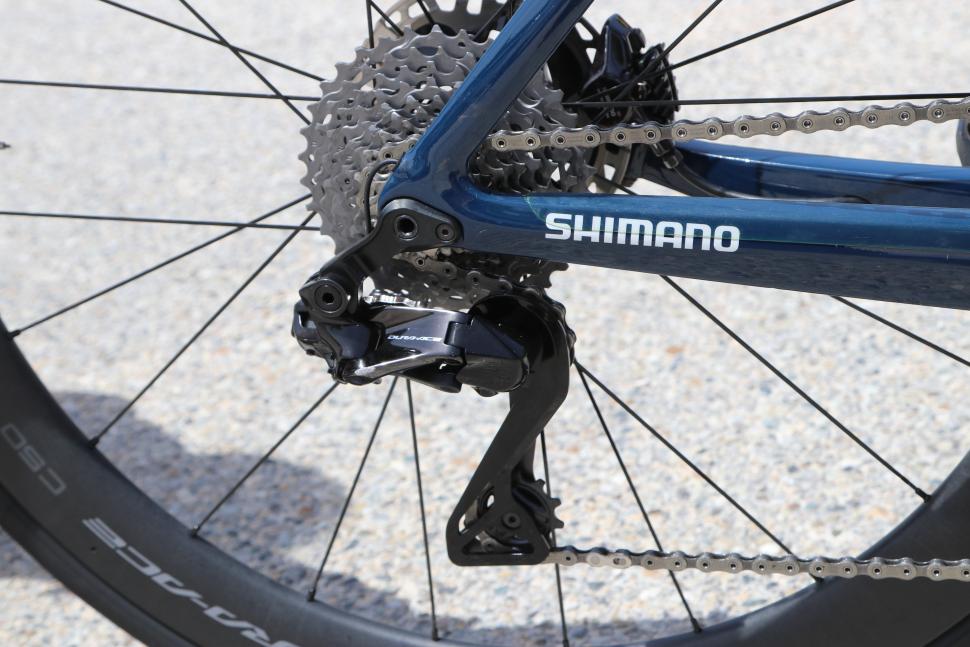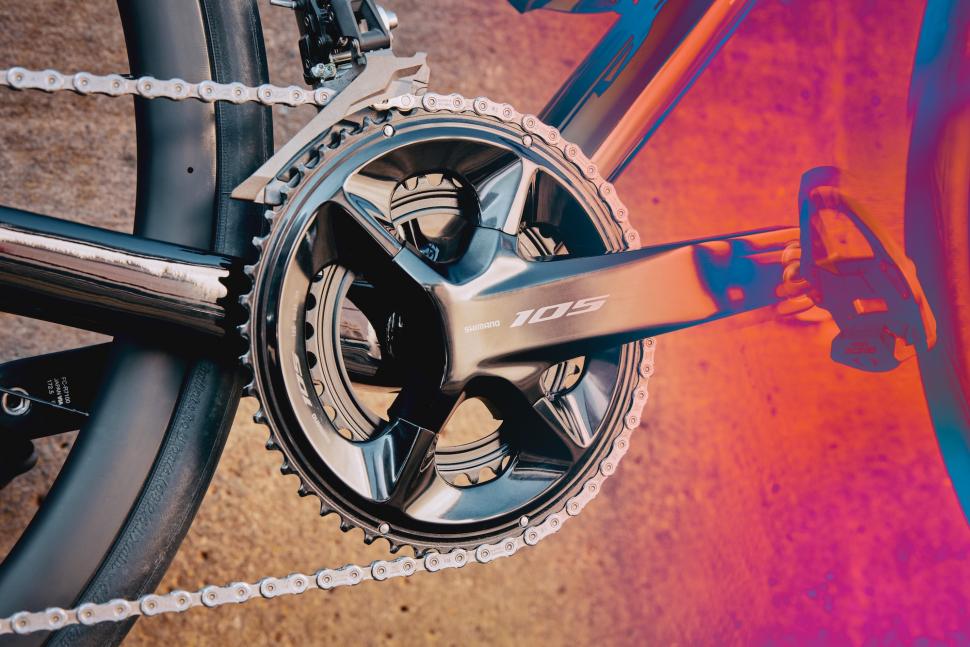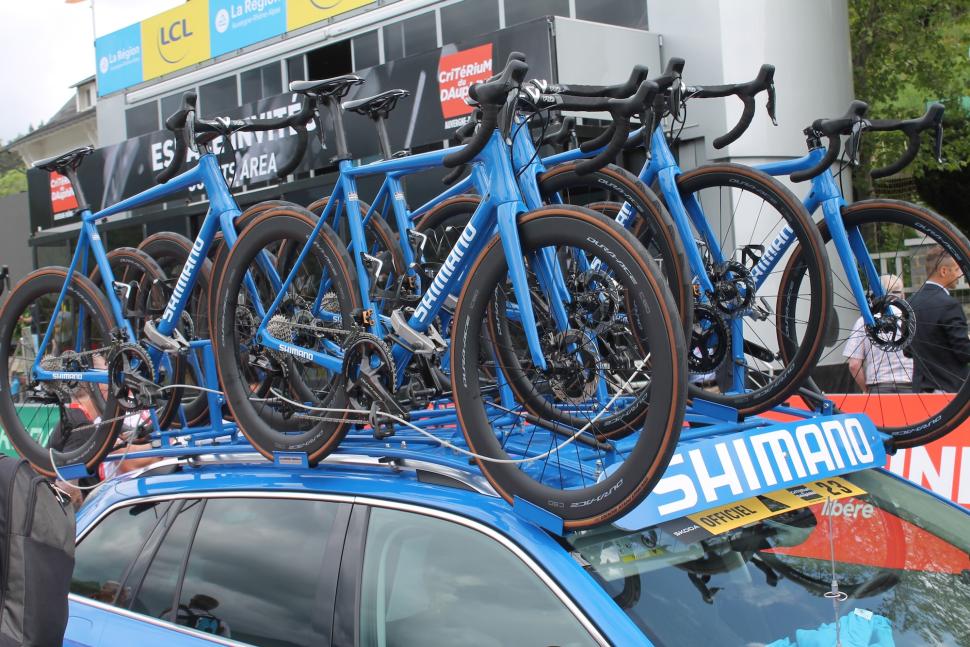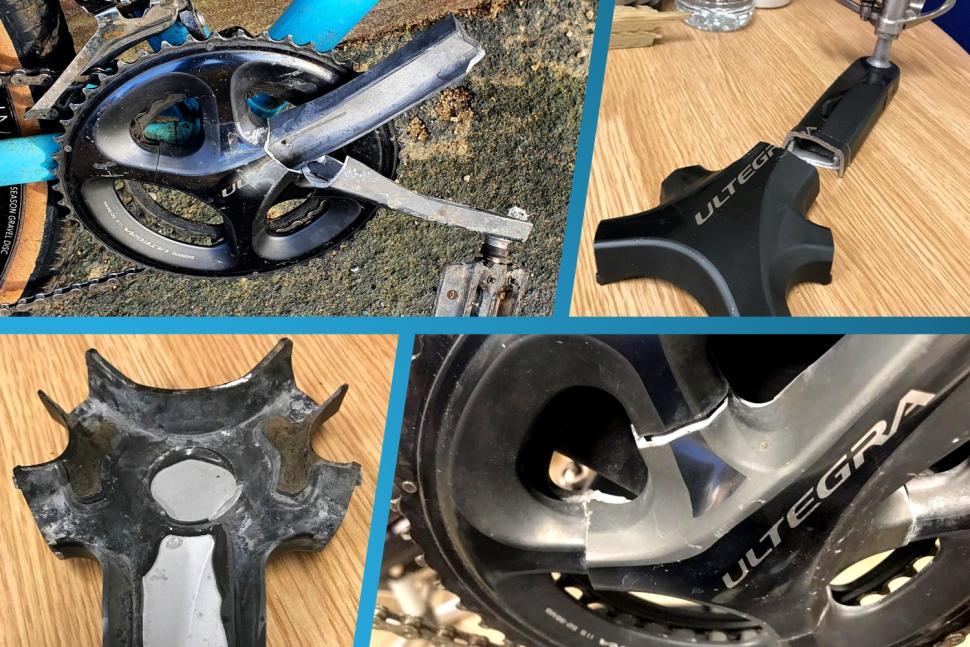- News
- Reviews
- Bikes
- Accessories
- Accessories - misc
- Computer mounts
- Bags
- Bar ends
- Bike bags & cases
- Bottle cages
- Bottles
- Cameras
- Car racks
- Child seats
- Computers
- Glasses
- GPS units
- Helmets
- Lights - front
- Lights - rear
- Lights - sets
- Locks
- Mirrors
- Mudguards
- Racks
- Pumps & CO2 inflators
- Puncture kits
- Reflectives
- Smart watches
- Stands and racks
- Trailers
- Clothing
- Components
- Bar tape & grips
- Bottom brackets
- Brake & gear cables
- Brake & STI levers
- Brake pads & spares
- Brakes
- Cassettes & freewheels
- Chains
- Chainsets & chainrings
- Derailleurs - front
- Derailleurs - rear
- Forks
- Gear levers & shifters
- Groupsets
- Handlebars & extensions
- Headsets
- Hubs
- Inner tubes
- Pedals
- Quick releases & skewers
- Saddles
- Seatposts
- Stems
- Wheels
- Tyres
- Health, fitness and nutrition
- Tools and workshop
- Miscellaneous
- Tubeless valves
- Buyers Guides
- Features
- Forum
- Recommends
- Podcast
 2022 Dauphine - Ineos Grenadiers Pinarello Dogma F 2
2022 Dauphine - Ineos Grenadiers Pinarello Dogma F 2Shimano hit by delivery problems across Europe as brand admits "serious" logistical challenges, longer lead times and "lower service quality"
Shimano has reported "serious logistical challenges" and a "lower service quality of deliveries" with longer lead times as a result, the company's warehousing and distribution operations suffering ongoing problems since it was outsourced to logistics giant Kuehne + Nagel last year.
There have been delivery issues reported in its Benelux region (Belgium, the Netherlands and Luxembourg), Shimano starting to deliver from another warehouse in France in response to the problems which have had a knock-on effect for Shimano IBDs (independent bike dealers) across Europe, Bike Europe reports.
It has been an ongoing area of concern since Shimano outsourced warehousing and distribution to Swiss logistics firm Kuehne + Nagel in 2023, the components giant's communications manager pulling no punches when explaining the less-than-ideal start to the companies' relationship.
Kim Edwards said they had faced "serious logistical challenges" with newly started warehouse operations subcontracted to Kuehne + Nagel, and admitted that it meant longer lead times and a "lower service quality of deliveries". She also suggested that the logistics provider's performance in Belgium "is only slowly improving".
"Once the problems surfaced earlier this year, Shimano took immediate action," she said. "We started delivering from another Shimano warehouse in France. We recently scaled up capacity again in France. Although many actions have been taken by Shimano and Kuehne + Nagel in recent months, Kuehne + Nagel's performance in Belgium is only slowly improving".
IBDs have been left in the dark over when goods will be delivered, lead times lengthening to more than six weeks as delays are felt across Europe. One told BikeEurope: "In the meantime, we have to hold the repairs, without being able to tell the customer when the bicycle will be ready. This is annoying for us and annoying for the customer."
It is believed one of the main issues is a "mismatch" between IT systems since Kuehne + Nagel took over the company's warehousing and distribution, a move which saw Shimano inventory moved from the Netherlands to a Kuehne + Nagel facility in Belgium, and out of the manufacturer's day-to-day access.
"Lead times vary per item and per warehouse," communications manager Edwards explained. "Stock availability in both warehouses is regularly shared with our customers through our customer platforms, newsletters and sales representatives. The delivery times shown on the MyShimano website are currently as accurate as possible. The lead times per country are adjusted weekly.
"We expect order lead times to decrease rapidly. As soon as we have more information about this, we will share this with our customers. We are in close contact with Kuehne + Nagel on what steps they will take to improve service levels. We are doing everything we can to achieve major performance improvements as quickly as possible. We apologise for the delays and temporary inability to provide our usual adequate service."
> New patent suggests Shimano 13-speed electronic groupsets are coming — here's what we know so far
It is the latest challenge to hit Shimano, the company in April reporting another significant fall in sales figures as net sales dropped 22.6 per cent in the first quarter of 2024 amid predictions its annual sales in Europe could contract by more than £170 million this year.
At the time, Shimano suggested the German, Dutch and Belgian bike market was strong, but other European countries are still said to be battling high inventories due to a cooling in customer confidence because of inflation and a challenging economic picture. Likewise, the North American market experienced a softening in demand coupled with high inventories.
Last summer, the company set its much-reported crankset recall in motion, recalling Hollowtech II models, including two generations of the popular Ultegra and Dura-Ace cranksets totalling 760,000 cranksets, and affecting over 2.8 million worldwide.
Shortly after, the company was allegedly hit by a massive ransomware attack threatening to release confidential data, before an investigation suggested that workers at its Malaysian supplier were subjected to "slavery-like" exploitation.
The new year began with the news that Shimano's financial report for 2023 showed it had lost £93 million in sales from its crank inspection programme and total sales were down 30 per cent on the previous year. However, it is worth pointing out that despite the financial blow, labelled in the accounts as "extraordinary losses", and a further reduction in bicycle-related sales, Shimano still posted a £322 million profit in 2023.
Dan is the road.cc news editor and joined in 2020 having previously written about nearly every other sport under the sun for the Express, and the weird and wonderful world of non-league football for The Non-League Paper. Dan has been at road.cc for four years and mainly writes news and tech articles as well as the occasional feature. He has hopefully kept you entertained on the live blog too.
Never fast enough to take things on the bike too seriously, when he's not working you'll find him exploring the south of England by two wheels at a leisurely weekend pace, or enjoying his favourite Scottish roads when visiting family. Sometimes he'll even load up the bags and ride up the whole way, he's a bit strange like that.
Latest Comments
- chrisonabike 33 min ago
I have a visual memory from childhood of one of this species of bricks popping loose from a bracket on a downhill section and flying away to smash ...
- wtjs 1 hour 22 min ago
There is an increasing 'disconnect' between comments in this topic and reality. Cords are either all cotton or mostly cotton and are going to last...
- ktache 1 hour 53 min ago
There are people out there who will make you the belt out of your old tyre.
- chrisonabike 1 hour 54 min ago
Furry dice and an air freshener for your helmet.
- AidanR 2 hours 7 min ago
Looking at the pictures in the linked article, the bikes aren't actually inconsiderately parked. The only issue is that they're on private property...
- Simon E 2 hours 42 min ago
Ah yes, those are hopefully not the 'master craftsmen' that has constructed a wide range of shoddy Italian cars and motorbikes over the years with...
- Simon E 3 hours 5 min ago
A SuperSix is definitely not an all-rounder....
- chrisonabike 3 hours 57 min ago
Just get them to walk a treadmill - or better, ride exercise bikes to power path lighting.
- AidanR 4 hours 33 min ago
So his advisers were trying to move funds around to cover losses, but in a way that needlessly created additional liabilities? It would have been...



Add new comment
6 comments
there is only one explanation to everything shimano: they have gone cheap.. they hired suits to maximize profit and lower quality
Having just paid £20 each for two Di2 cable adaptors that must have cost at least 10p each to make, I have to disagree.
His point is they are cutting corners on manufacturing costs. Thus the recalls. But they charge more for it. So you pay more, but the underlying product may not be as good. That's what the suits always plan to do.
Outsourcing invariably fails to deliver the anticipated savings as the number-crunchers they employ don't truly understand how the system actually works. IT incompatibility is so widespread and 'making it work' is full of pitfalls and expensive bodges which add complexity and opportunities for failure (and the bigger the project they are both more likely and will have a greater impact).
It's similar to the nightmare of government and council contracts being given to private companies, whose sole concern is making a profit.
No - that's just bad outsourcing.
Good outsourcing enables companies to focus on core activities, release cash and working capital and re-invest that back into improved products and services.
Outsourcing can also be good for employees e.g. moving employees in specialist functions like transport operations into a new employer for whom that's their core business - meaning the employee gets better IT and new career devt opportunities.
That sounds great (it sounds like a sales brochure) but more often the reality is as I described it. Outsourcing is invariably used as a cost-saving measure, maybe it is sold as about 'efficiency' but it's really about saving money. External contractors and 'strategic business partners' are tax-deductable but are not invested in your company's future while skilled and knowledgeable workers are often seen as a burden, not something to be valued.
It's why we have offshore call centres for banks, IT back rooms etc. My team was at risk from this back in the 1990s, though we found the idea that some faceless bods in another country or wherever could do & know a fraction of what our team did so preposterous that we laughed. The manager (a bit of a jerk, one of many) left the company not long afterwards.
When HSBC got rid of the Swansea call centre and closed my local branch I closed my account and gave them a piece of my mind. Contrast that with Nationwide (where I bank now), who have moved their Shrewsbury branch to a larger, more prominent location on the main shopping street. It's a pleasure to walk in and be greeted by a real person. I prefer to give my money to/borrow from an organisation that invests in that kind of service instead of a bunch of crooks.